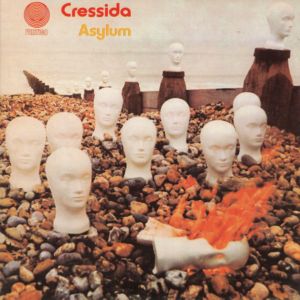
- Format: MP3

Japan 24-Bit Remaster
Cressida was a British art rock band formed at the tail-end of the 1960s in the shadow of (and their music very much in thrall to) the Moody Blues, with a heavy organ and Mellotron sound courtesy of keyboard player Peter Jennings. The original lineup of Jennings, Angus Cullen (vocals, guitar), John Heyworth (guitar), Kevin McCarthy (bass), and Ian Clark (drums) was signed to Polydor's progressive rock imprint, Vertigo Records. The group had a dense, lyrical sound, and Cullen's singing was of a pleasing, almost pop nature, in a vein similar to Justin Hayward, Paul McCartney, et al.
Their self-titled debut album was filled with hauntingly beautiful melodies and relatively accessible, straightforward song structures. It was somewhat derivative of antecedents such as the Moody Blues, but it did well enough to justify a follow-up in 1971. Heyworth had departed by the time of the second album, entitled Asylum, replaced by John Culley and Paul Martin Layton (of the New Seekers) on guitar, and with Harold McNair added on flute as well. That album, produced by Ossie Byrne, was more ambitious instrumentally and, surprisingly, given Byrne's previous work with the Bee Gees and Eclection, less focused on Cullen's vocals.
By 1972, however, the group had run out of steam and recording contract, and they never really had a chance to develop a history. Ian Clark moved on to a brief stay with Uriah Heep and John Culley became a member of Black Widow.
More highly melodic progressive rock, this time built around longer songs and extended instrumental passages — among the latter, "Munich," which was alternately titled "Munich 1938: Appeasement Was the Cry; Munich 1970: Mine to Do or Die," was surprisingly accessible at nine minutes and change, built on Peter Jennings' extended organ cadenzas embellished with John Culley's crisp electric guitar flourishes, all wrapped around a pleasing array of melodies that easily carry the song's length.
The three extended numbers that comprised the original LP's side two also make for fascinating listening, Angus Cullen's McCartneyesque vocals calling to mind the Moody Blues in their prime, while the band's hard, at times slightly jazzy, instrumental attack evokes echoes of Caravan with, perhaps, a touch of the most energetic of Deep Purple's Jon Lord-spawned classical experiments. The group's downfall may have been their reliance on virtuosity, as opposed to raw wattage and brute force in their attack — with Emerson, Lake & Palmer, Keith Emerson was bringing crowds of 20,000 teenagers at a time to their feet by abusing his organ, while as part of Cressida, Peter Jennings on "Let Them Come When They Will" plays the kind of break that would have wowed them in a club in front of maybe 200 people (while Cullen's singing takes on a resemblance to Jim Morrison in the middle of the track). It's all sort of the difference between relating to one's music and audience on a retail basis, as opposed to wholesale — Cressida never got past the former, and it makes Asylum a very pleasing album but also a very demanding one.